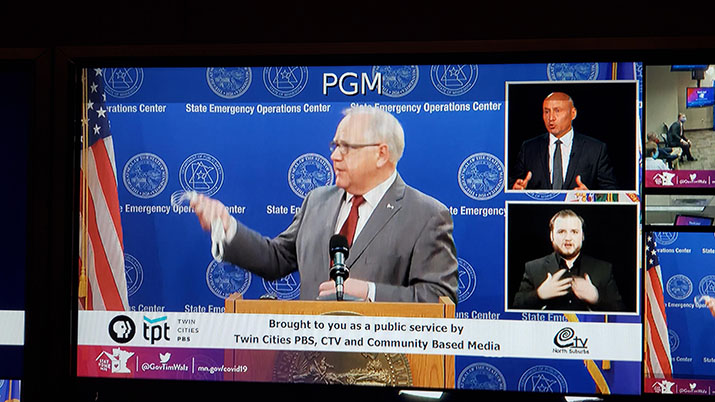No matter your language, you deserve to feel safe
July 16, 2020

Imagine you’ve recently moved to a different country – one where English isn’t spoken, and you don’t speak the language very well. Now imagine there’s some sort of disaster, such as a tornado or flash flood. You need information you can understand about where to take shelter, who can help you, what happens if you need medical attention or food. What if you couldn’t get it? Imagine how scary that would feel; how isolating.
That can happen right here in the United States – even here in Minnesota. It’s an issue that the Department of Public Safety (DPS) and Twin Cities Public Television (TPT) are teaming up to solve. The goal? To improve the availability of public health and safety information to people who speak English as a second language (ESL).
Launched in 2017 with help from Metro region emergency managers, TPT NOW (channel 2.5) provides daily situational and emergency response communications, including warning and alerts in four languages: English, Hmong, Somali and Spanish. Preparedness information includes routine topics such as flu shots and winter car kits, but in emergencies such as the COVID-19 pandemic, TPT NOW supports local and state agencies as a dedicated service reaching cultural communities.
But don’t think of TPT NOW as a news station. They don’t edit any of the messaging they receive. Nor are they a government agency. Lillian McDonald, who is the managing director of Emergency Response Services at TPT, describes TPT NOW as the “sweet spot” between news and education, supporting public officials trying to reach target audiences. McDonald says, “We provide information the state government needs to get out to the community long after news crews have finished their live shots.”
With the need for real-time information during COVID-19, TPT NOW used existing relationships with community and cultural media to broadcast live news conferences in four languages. The simulcasts are then picked up by community broadcasting partners: Somali-TV, Hmong-TV, TPT NOW (Spanish), and TPT MN (English).
This partnership is more than language translations. If you’re translating word-for-word, for example, you’re likely to transfer some English idioms (think “play it by ear” or “ballpark figure,” for example) that simply don’t translate. And in public safety messaging – whether it’s an emergency or not – clarity is key. That’s why it’s so helpful that TPT works with established linguists from Minnesota communities: They understand what their cultural group needs in order to understand and take heed of the messaging. “When you see public safety programming in your own language by your own community with your own community, people pay attention, and that’s huge,” said McDonald.
The Department of Public Safety has been partnering with TPT NOW since 2015, but it has only been recently that Minnesota’s diverse populations have discovered this work. That’s because, during the COVID-19 pandemic and the civil unrest following George Floyd’s death, TPT NOW and its broadcast partners found increasing ESL audiences watching and streaming news conferences in each language. In fact, TPT NOW’S highest-performing simulcast was an address by Gov. Tim Walz on May 29, when he discussed the civil unrest and resulting curfew. That broadcast alone reached 40,843 screens and was aired by two Latinx radio stations in Minnesota.
But DPS and TPT want to get the word out even further. We want diverse communities to know that there’s a place they can turn to and trust to provide them with the most accurate and up-to-date information during a public safety or health crisis. Because, no matter what language you speak, you deserve to know what’s going on during an emergency. DPS’ partnership with TPT NOW fills that important niche in Minnesota.

